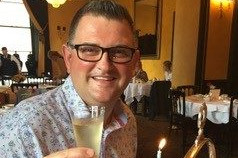Cochlear implant blog: Part one

To mark International Cochlear Implant Day (25th February), our volunteer Marc Van Cartier-Kerr shares his journey to receiving an implant. Here is part one of his story.
Part one: My shrinking world
My world was shrinking – that’s wrong actually – my world had become a prison.
I was 36-years-old, still in full time work (just), and slowly descending into total isolation. As my hearing loss deteriorated, so did my self-esteem.
I remember the day my world changed. It was January 2013 and I had been to audiology for new hearing aids.
The appointment went as normal until the audiologist turned to me and said: “We have no more hearing aids for you. The ones you have are turned up to maximum and there is nothing else to offer you”.
The floor disappeared from under me. I was in freefall. The moment I had dreaded had finally come.
My silent prison
My audiologist suggested a referral back to see an ENT specialist and to see if I might be suitable for a cochlear implant.
I didn’t really give it much more thought; instead I was thinking that I was looking at 40 odd years of living in this silent prison.
Socialising had become non-existent. I couldn’t go to the cinema, I struggled in groups and had long since given up going on night out in town because I felt so lost and scared. I had one close friend who I did things with. He was very understanding and even suggested that we both learn British Sign Language (BSL) so we could still go out to do things and communicate.
A few months later I attended my ENT appointment and they referred me on the pathway for a cochlear implant. My friend researched implants and encouraged me to look at them too.
I just felt there was nothing left to be done. I was in a deep depression, angry all the time and felt like committing suicide to end the constant pain.
It was at this low point that my audiologist told me about Hearing Link. In a moment of pure desperation, I emailed its Helpdesk and said: “I can’t go on”.
Hearing Link and its volunteers swung into action, and soon I was meeting other people with cochlear implants. People who were like me, trapped, but now free to interact in a hearing world to different degrees. I finally had hope.
A new hope?
I attended Crosshouse Hospital in Kilmarnock for my assessment, and I took my friend with me. We asked so many questions, so much so the staff said they had never been questioned so in-depth before!
A few weeks later I received the letter. I had been accepted to receive a cochlear implant. I couldn’t do it – I was petrified.